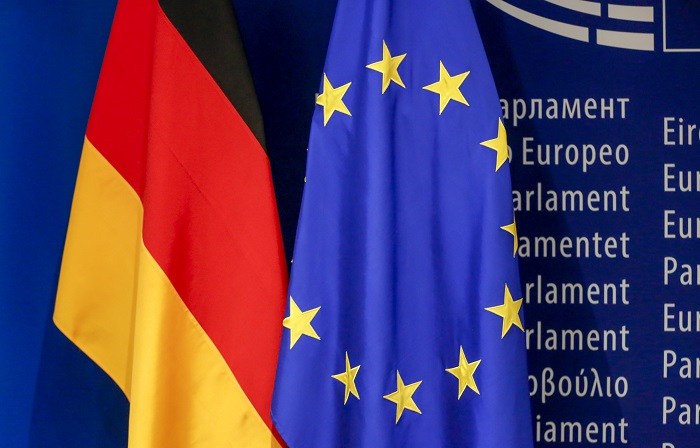BRUSSELS BEHIND THE SCENES
Weekly analysis and untold stories
With SAMUEL STOLTON
Other Brussels behind the scenes stories:
Behind the statues, European colonialism persists in Africa’s diamond mines
Telling the truth in a post-truth world
European business is embroiled in a Colombian guerrilla war
George Floyd's blood is on Europe's hands, too
The EU is trading in dead tigers
A New Europe, made in Germany?
Angela Merkel sits hunchbacked, an expression of consternation embedded into the folds on her face.
Her Chief Europe advisor, Uwe Corsepius is in the corner, legs crossed daintily, a neat pile of freshly printed documents on his lap as he turns his nose up at the colossal smile glaring at him from the television screen, belonging to a one Ursula von der Leyen.
BRUSSELS BEHIND THE SCENES is a weekly newsletter which brings the untold stories about the characters driving the policies affecting our lives. Analysis not found anywhere else, The Brussels Times' Samuel Stolton helps you make sense of what is happening in Brussels. If you want to receive Brussels behind the scenes straight to your inbox every week, subscribe to the newsletter here.
These are the final few moments between the Commission President and the German Chancellor before the pair appear publicly in a live videoconference, marking the start of the Germany Presidency of the EU.
The words that emerge from in-between their lips - unprecedented crisis – unprecedented answers – crucial time – effective unity - forge agreement – no time to lose, etc, tell the tale of a crippled Europe, a weather-beaten bloc attempting to heave itself out of the socio-economic turmoil imposed by the coronavirus pandemic.
But such a chronicle is only a partial reading of the present moment.
The dominant and popularly accepted narrative is that the German Presidency will chair a Council fraught with predominantly internal conflicts exasperated by the public health crisis: Agreeing on a new budget and recovery fund, the proposal to link compliance to the rule of law with member state funding, and of course the nauseating quagmire of the UK’s withdrawal from the EU.
The leadership role that the German Presidency will play in this context shall indeed be key in rebuilding Europe as it charts its path out of the crisis, but it will also expose areas that the Germans would much rather ignore. And such a hesitancy was bared startlingly on Thursday afternoon.
When pressed by journalists on whether Germany would consider measures to support pro-democracy activists in Hong Kong, the response from Merkel and von der Leyen was achingly lacklustre.
They noted that in future trade talks with China – a major economic partner for the EU – the issue of human rights would of course be raised, as would the bloc’s imperatives in the field of climate sustainability.
“I believe that German asylum law, as we have it, is there for people everywhere. In other words, I do not see at the moment that we need to do anything beyond that,” Merkel said.
The truth is, Germany’s dedication to extending the arm of democracy in Hong Kong is little more than a façade.
Over the past year or so, we’ve seen German Foreign Minister Heiko Maas conduct several photo opportunities with leading Hong Kong pro-democracy activist Joshua Wong during the latter’s travels in Europe. It has become clear now, following Merkel’s comments on Thursday, that such actions were merely as they were: two faces staring blankly into the depths of a camera lens – Wong seeking European solidarity, Maas seeking voguish publicity.
The recovery, the rule of law, the Green deal, digitalization and Brexit are all of course vitally important issues for the Presidency to pursue. But prioritizing these issues should not be to the detriment of wider grand narratives in the future maturation of the EU.
The bloc’s relationship with China is a geopolitical imbroglio that the Germans will have to face head on. Despite the Leipzig summit in September being postponed due to the coronavirus, EU Council President Charles Michel said recently that the meeting will still go ahead in some format, bringing together Chinese authorities with all 27 European heads of state, hosted by Germany.
Should the historical guilt that brutally plagues the German mind yield any benefit for the long-term future of the EU, what better way to employ it than to defend, on the global stage, causes of liberty such as those we see in modern Hong Kong?
When we talk about a ‘New Europe, made in Germany,’ the role of the country shouldn’t be relegated to some sort of a caretaker Presidency - nursing the bloc back to full health before the next EU member state comes along to take the reins. Merkel and the Presidency should be cognizant of the fact that the next six months are not merely about recovery.
Rather, the most enduring and substantial impact the Germans can have on the future of the bloc will be to exercise the Presidential baton in a way that substantiates an irrepressible and unrelenting European will to defend injustice everywhere.
For this cause, how Europe strategically negotiates its future relationship with China is of principal importance. If we are to be bestowed a New Europe, Made in Germany, it should be a Europe that the world can revere.
BRUSSELS BEHIND THE SCENES is a weekly newsletter which brings the untold stories about the characters driving the policies affecting our lives. Analysis not found anywhere else, The Brussels Times' Samuel Stolton helps you make sense of what is happening in Brussels. If you want to receive Brussels behind the scenes straight to your inbox every week, subscribe to the newsletter here.

